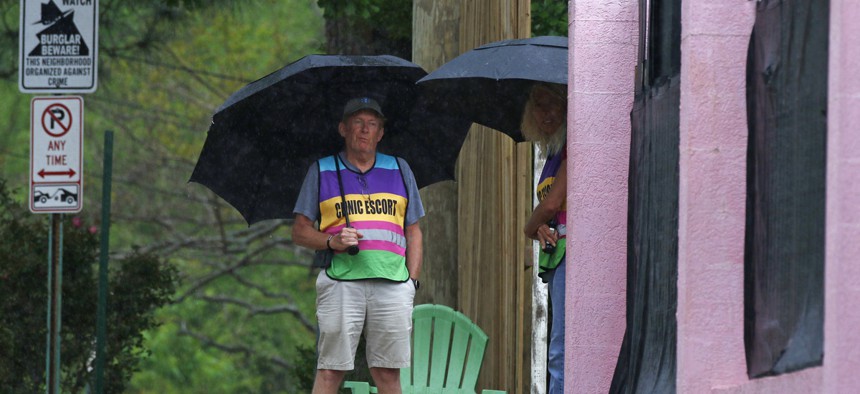Abortion Clinic Protesters Are Being Arrested for Violating Stay-At-Home Orders

Clinic escorts wait to protect patients from anti-abortion protesters in Jackson, Mississippi, on March 23. AP Photo/Rogelio V. Solis
In several cities across the country, anti-abortion protesters are among those testing local and state orders telling people to stay home, saying they see their actions as constitutionally protected.
As police ramp up enforcement of people violating stay-at-home orders and prohibitions on large gatherings, anti-abortion protesters contend that they still have the right to demonstrate outside reproductive health clinics.
In San Francisco, police issued the first citations for violating the city’s stay-at-home order to protesters who stood in front of a Planned Parenthood clinic on April 3 distributing fliers. The protesters argued that they were providing an “essential service” and should be allowed to continue during the pandemic, despite a statewide order that limits allowable trips outside to things like grocery shopping, medical visits and exercise. In a video of the incident that one protester posted to social media, Terrisa Bukovinac, the founder of Pro-Life San Franciso, said that they are “are doing everything we can to follow the law and ensure the safety of this community,” while reading from a legal opinion from her attorney stating that the right to protest was protected during the pandemic.
In the video, one of the police officers responded that “the constitutional right to protest...has to take a back seat to the health order.” The protesters then told police they were being “inconsistent” and “discriminatory” in their enforcement of the stay-at-home order by “specifically targeting” those outside abortion clinics. The same argument has been raised by other protesters across the country.
In North Carolina, police in several cities report breaking up gatherings that violate the state’s order limiting groups to 10 people or less. One of the largest gatherings, a group of about 50 people protesting around an abortion clinic in Charlotte, ended with 12 citations and eight arrests when some protesters refused to leave. A similar situation in Greensboro prompted a federal lawsuit against the city’s mayor and the police lieutenant in charge of the arrests.
The lawsuit states that four individuals arrested and charged with “traveling for a non-essential function” in Greensboro were merely “engag[ing] in ‘outdoor activity’” permitted under the stay-at-home order. They similarly believe that application of the order to abortion protests is “discriminatory” and “based solely upon the pro-life content and viewpoint of their speech.”
Protesters have gained the support of prominent lawmakers, like U.S. Sen. Ted Cruz from Texas, who took to Twitter to call the arrests “unconstitutional” because the protesters were “exercising core First Amendment rights.”
But legal scholars question the viability of these claims, saying the arrests and citations don’t stem from protesting, but the violations of public health orders. Ron Glenn, a spokesperson for the Greensboro Police Department, emphasized in a statement that “the intent of the stay-at-home order is to curb the public health crisis in our community.”
The American Bar Association in March said that lawsuits challenging restrictions on public gatherings are likely “doomed to failure” because local governments are allowed to take necessary measures to promote public health. James Hodge, a law professor at Arizona State University, told Bloomberg Law that “the idea that you’re going to walk into court and object vehemently and successfully against known, proven public health social distancing measures that are being employed currently is not a winner.”
Protests aren’t the only thing making it harder to abortion clinics to operate during the pandemic. Some governors have issued orders to shut down clinics in order to conserve personal protect equipment for medical personnel, although abortion providers say that closing their doors will lead to women traveling out of state for reproductive health services, which can be dangerous during the Covid-19 outbreak. The battle over whether or not abortion clinics must be considered an essential service and allowed to stay open has made its way to the Supreme Court, but the high court has yet to resolve the issue.
Planned Parenthood is leading the charge in that lawsuit, as well as attempting to support individual clinics that have seen increased protesting activities during the pandemic. Bonyen Lee-Gilmore, the director of state media campaigns for Planned Parenthood, said that clinics are following all public health guidelines to ensure the safety of patients. “While public health providers work together in our communities to care for patients whose health care can’t wait, some anti-abortion activists are exploiting the COVID-19 pandemic to push their ideological agenda. This is not a time to play politics,” she said. “The people choosing to ignore the severity of this public health crisis—by continuing to gather in groups protesting outside our health centers, encroaching on our patients’ social distancing space, and spreading misinformation about reproductive health care—are engaging in reckless behavior that will put people’s lives in jeopardy.”
OTHER STORIES on Route Fifty:
NEXT STORY: Five Years of Route Fifty






